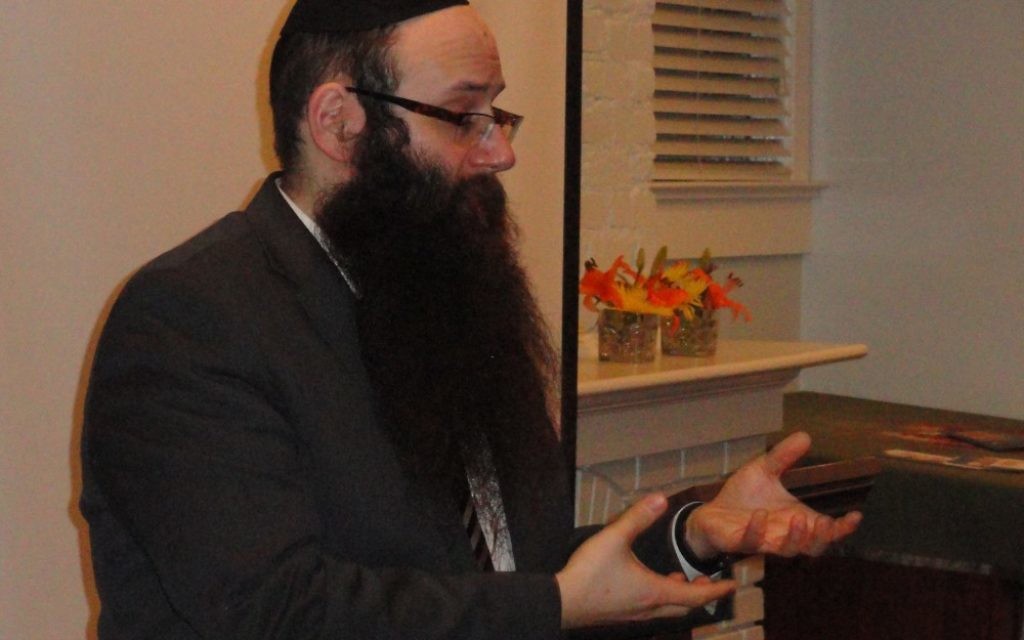Science and Faith Not So Far Apart, Professor Says
When Binyomin Abrams started studying science as a young man, he discovered he was “completely wrong about everything,” he told an audience at Intown Jewish Academy on Tuesday night, May 10.
The subject of his lecture was “Science and Faith,” and Abrams, 35, dissected the myriad dichotomies between the two doctrines, asserting they can and do coexist.
Now a chemistry professor at Boston University, Abrams was raised in Montreal and acknowledged that, despite his Orthodox appearance, his childhood and adolescence were marked by an almost total lack of Jewish instruction.
Get The AJT Newsletter by email and never miss our top stories Free Sign Up
“I was always led to believe that this Judaism thing was an all-or-nothing relationship. I thought it was just the absence of lobster, the existence of hunger,” he joked.
The intricacies of his religion became somewhat clearer when he attended New York University for his doctorate. “Do one thing to make the world better — that’s all that is really asked of you,” he was told by a fellow Jew, who suggested he visit a neighborhood seder.
Abrams did more than that. “I owed it to myself to figure out what being Jewish actually is. I was trained as a scientist, so why not take a scientific approach to studying Judaism?”
That approach came down to lots of research, he said. “It’s getting your hands dirty, getting confused, flummoxed and flustered, and treading the waters. Then you re-evaluate — take the results of that research, see if they jive with what you believe and understand.”
Abrams concluded that the science he loved and the faith he belonged to were not incompatible. “My entire life I had always heard that ‘Science and Torah is like oil and water,’ ” he said. “Given what I’d heard about this conflict between science and religion, I figured there must be no religious scientists.”
It turns out he was wrong, and through his studies he found scholars such as Robert Boyle, an Irish philosopher and inventor in the 1600s who was able to “discern the inevitable subtlety of nature’s curious workmanship,” Abrams said. “He was stricken by the greatness of G-d’s creation.”
Abrams quoted Nobel laureate and physicist Isidor Rabi as saying, “Physics filled me with awe … and brought me closer to G-d.” According to Abrams, Rabi’s students would be asked just one question when submitting papers: “ ‘How will this bring you nearer to G-d?’ If they could answer that, it was a worthwhile project.”
Biologist and geneticist Francis Collins, the leader of the Human Genome Project, has written extensively about the synthesis between science and faith. “Few of his books are about biology; most are about G-d,” Abrams said. He quoted Collins as writing, “Belief in G-d is an entirely rational choice, and the principles of faith are in fact complementary with the principles of science.”
“For me, that was the end of it. With this I stopped looking,” Abrams said in his speech. “This message I heard my entire adolescence about this conflict was grossly exaggerated.”
German theoretical physicist Max Planck said of science and religion that one should not exclude the other; rather, they are integral and mutually interacting. “Man needs science as a tool of perception, but he also needs religion as a guide to action,” Abrams said. Planck “saw this world analogously as a gift. You play around with it and try to learn about it. You don’t sit there and do nothing. He felt that science and religion are two modes of interaction that every person should use.”
Abrams said science is all about figuring out how things work — what button to push to make something happen and how a mechanism is working so that you can manipulate it in the best possible way. “But religion is how you should use it and what it can do for you,” he said, “because knowing what something does doesn’t mean you know how to use it. From Planck’s perspective, it wasn’t just that they could interact; he felt that science and religion must interact. And if they don’t, you’re not doing either of them properly.”
A degree of incertitude, however, is endemic in any scientific endeavor, Abrams conceded, citing Werner Heisenberg, another Nobel laureate and physicist. Heisenberg gave science the uncertainty principle, postulating that there are things in the physical world “we weren’t capable of measuring or don’t have the right tools to measure or that we fundamentally cannot measure, period,” Abrams said.
“In the late 19th or early 20th century came quantum mechanics. Those principles are irrefutable and state that there are fundamental things that cannot and will not be ever known. Every single atom has a degree of unknowability and yet still leads to this physical world that we live in.”
The bottom line, Abrams said, is “we have to sit down and be willing to learn more and accept that questions are not a bad thing and that they’re people out there who have answers and that there are questions that are fundamentally unanswerable.”






comments